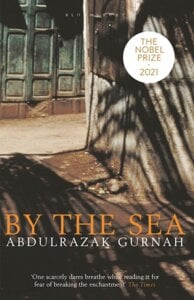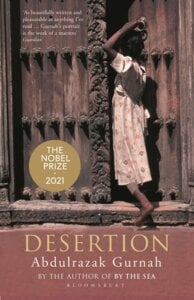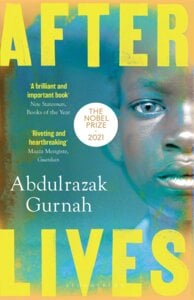Curious about 2021 literature laureate Abdulrazak Gurnah but can’t decide which of his books to start with? We asked three members of the literature committee at the Swedish Academy – who decide on the year’s Nobel Prize in Literature – to give us their recommendations.
Anne Swärd on By the Sea

In Abdulrazak Gurnah’s novels the protagonists often long for something they do not know what it is, something they cannot name. In ‘By the Sea’ (2001), a favourite of mine among his works, this inner conflict – deeply human – is subtly present throughout the story. Longing for a place that does not exist is the dilemma of both the main characters. Saleh Omar, who arrives alone in a foggy English costal town, is sort of an anomaly in that he decided to flee his country so late in life, and all alone. Latif Mahmud, a much younger fellow countryman who left Zanzibar many years ago, seems to share with Saleh Omar the predicament that neither the motherland nor the families they left behind could offer them any real feeling of belonging. Without sentimentality, but with a strong sense of compassion, the author introduces us to their lives. And how their destinies are intertwined, or rather tangled up in one another, all because of mistakes and unfortunate dealings in the past. ‘By the Sea’ holds so many of Abdulrazak Gurnah’s literary qualities. The rhythmical prose, the observant eye for just the right details, the complexity of the characters’ psychologies and backgrounds, and the sensitive, evocative pace in which he approaches the dark core of the story.
Ellen Mattson on Desertion

‘Desertion’ (2005) begins in 1899 in a small, dilapidated town on the East African coast, when Englishman Martin Pearce is invited into the local shopkeeper Hassanali’s home and falls in love with his sister Rehana. This scandalous affair is the starting point of a long and winding tale, linking two families and reaching across centuries and continents. Fifty years later two brothers grow up in Zanzibar, representing different approaches to tradition: the younger Rashid is the deserter who leaves to study in England while the older Amin remains at home to obey and look after his parents. While Amin’s life is broken by a tragic love affair and the political situation after independence, the exiled Rashid becomes a writer in order to explore and understand the past he has been cut off from and perhaps find a way to mend what has been broken. It is a beautifully written novel about memory, loss and the mysterious ties that connect people even when they are separated by time and geographical distance.
Anders Olsson on Afterlives

One of my favourites is Gurnah’s latest novel ‘Afterlives’ (2020), which has many affinities with his fourth, breakthrough novel, ‘Paradise’ (1994), and takes place during the German colonisation of East Africa in the beginning of the 20th century and thereafter. In both cases Gurnah gives us a lucid history lesson in the form of a captivating story of individual lives. His way of doing this is to filter the brutality of events through young and vulnerable protagonists with limited consciousness of reality. In the breaking up of Arab hegemony in the coastal region of East Africa we follow the dramatic fates of the orphaned youngsters Ilyas, Afiya and Hamza. Ilyas escapes his servitude under an Arab slave holder only to be kidnapped by the German forces as one of their native soldiers (askaris). Even Hamza is owned by a merchant in a caravan only to volunteer as a German askari, where he becomes dependent on an officer who sexually exploits him. The capricious winds of history rule, and the fates of the trio are very different. Gurnah’s style is wonderfully clear and nuanced, but he can also be sarcastic and hilarious in a deadpan way. One of the finest moments in this novel is the delicately written love story of Hamza and Ilyas’ sister Afyia, a variation on Pyramus and Thisbe. The last word however must be terrible, when the Nazi engagement of Ilyas is revealed, and the denouement of ‘Afterlives’ is just as unexpected as it is alarming. If Hamza is saved, Ilyas is not. What happens to him I will let the reader find out.
First published November 2021